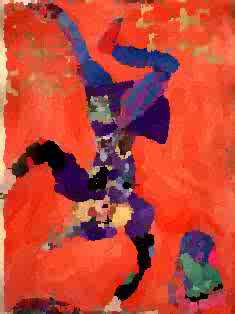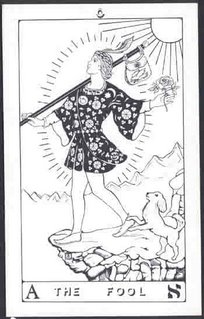 I am continuing to wade through several piles of journal articles and books for three major papers for seminary. I shouldn't be taking time away from study for a blog post, but one area of reading has been particularly interesting.
I am continuing to wade through several piles of journal articles and books for three major papers for seminary. I shouldn't be taking time away from study for a blog post, but one area of reading has been particularly interesting.For my Apologetic Traditions paper I am writing a missional apologetic for Burning Man. One of the research trajectories I have been pursuing is the concept of holy fools contextualized within post-modernity. I have found several resources that have shed light on this topic and the apologetic. One source is an article by Peter Phan from Theological Studies journal titled "The Wisdom of Holy Fools in Postmodernity." Phan believes that that paths of communicating wisdom in the past, such as mythos or "the form of dramatic narratives explaining the origin and operation of the universe and the place of humans within it," as well as logos or forms of communication that involve discursive reasoning, are inappropriate means of communicating wisdom within the context of the failure of modernity and the rise of postmodernity. Instead, Phan argues for morosophia, the path of foolish wisdom. Phan states that "the 'wise fool' is believed to possess a source of knowledge that his more akin to supernatural and inspired wisdom," and he connects this to Paul's discussion of the cross of Christ as God's folly in 1 Corinthians.
This theme is picked up and addressed at length in another resource I am drawing from by Laurence Welborn in an article for Biblical Interpretation titled "MOROS GENESTHO: Paul's Appropriation of the Role of the Fool in 1 Corinthians 1-4." Welborn notes that most commentators assume Paul is referring to Pagan perceptions of the absurdity of the notion of a crucified and rising God inherent in the Christian gospel. Welborn takes exception to this assumption and argues persuasively that Paul is likely framing himself as messenger and his gospel message in light of the Greco-Roman stage comedy that involved a fool character known as a mime or a clown. Paul draws upon this motif for two purposes. First, "the adoption of the role of the fool was a strategy praticed by a number of intellectuals in the early Empire." The fool provided the freedom "for the utterance of a dangerous truth." Second, the identification with the fool and a message of foolishness enabled him to communicate the paradox of God's wisdom being displayed to the world through means considered foolish by normal human standards of wisdom.
 This brings me to the consideration of Jesus as the Holy Fool. I recognize that to use this terminology is to court charges of blasphemy by Christians. Other Christians who have described Jesus this way have received serious criticism, including Michael Frost who wrote Jesus the Fool: The Mission of the Unconventional Christ (Lion Publishing PLC, 1994;, expanded and updated version forthcoming through Urban Neighbors of Hope), and Elizabeth-Anne Stewart who wrote Jesus the Holy Fool (Sheed & Ward, 1999). Before you send along your comments of complaint, consider the case for Jesus as Holy Fool.
This brings me to the consideration of Jesus as the Holy Fool. I recognize that to use this terminology is to court charges of blasphemy by Christians. Other Christians who have described Jesus this way have received serious criticism, including Michael Frost who wrote Jesus the Fool: The Mission of the Unconventional Christ (Lion Publishing PLC, 1994;, expanded and updated version forthcoming through Urban Neighbors of Hope), and Elizabeth-Anne Stewart who wrote Jesus the Holy Fool (Sheed & Ward, 1999). Before you send along your comments of complaint, consider the case for Jesus as Holy Fool.Stewart notes that we often think of Jesus with various titles such as Christ, the Word, Savior, Messiah, High Priest, Suffering Servant, Son of Man, Son of God, Jesus as Lord, but rarely if ever do we consider Jesus as Holy Fool. A biblical case can be made for this motif and if we don't consider it Stewart suggests that "we not only miss a theme of the Hebrew and Christian Scriptures, but we also immunize ourselves against the breath of the Holy Spirit."
Stewart reminds us that Holy Foolishness is found in the Hebrew Prophets such as Jeremiah wearing a loin cloth, Hosea marrying a prostitute, Isaiah walking barefoot and naked, and Ezekiel lying on his side for extended periods of time. Stewart then connects this to the "foolish" aspect of the gospel stories about Jesus, from the table fellowship he extended to social outcasts that served as "a mockery of traditional expectations" of the escthatological banquet, to Jesus being called a madman, to his articulation of the Fool's Path that "involves emptying oneself to find fullness, letting go to possess, losing life to find it. ..."
Stewart believes that considering Jesus as the Holy Fool provides an important facet for enriching our understanding of him, and within the context of post-modernity I believe it also provides an important motif for communicating the gospel. And while I hope the church in the West can consider the possibilities provided by Jesus the Holy Fool it represents a perspective that is radically challenging to our Christologies, ecclesiologies, and understandings of Christian spirituality. As Stewart states:
"Following Jesus is a radically different proposition for example, than following 'my buddy Jesus' and practicing a Christianity which can only be described as self-indulgent. Precisely because contemporary Western Christianity has become disconnected from the Holy Foolishness of Christ and from the Dionysian elements of religion, the person of Jesus has been 'tamed' into a marketable construct far removed from the gospel Jesus or from the living Christ who can still be encountered in Third World nations. ... [The Western church] cower[s] in dread before the figure of the Dionysian Christ because he is too passionate, too alive, and too challenging to be attractive."
"Those who tame Christmas into a birthday party for children or who reduce Easter to a celebration of the rites of Spring are following a Jesus who bears little resemblance to the Jesus of the Gospels. In their Christianity, there is no place for Jesus the Clown, or Jesus the Jester or Jesus the Trickster; such a Jesus is too demanding, too disturbing, too ridiculous. And yet this Jesus, vested as 'a personification of festivity and fantasy,' in an age which has lost both, and wearing both grease paint and halo, 'is able to touch our jaded modern consciousness as other images of Christ cannot.'"
I am looking forward to weaving the strands of the holy fool into a powerful missional apologetic framed in a context for Burning Man. I sense a similar power for Christians as holy fools to follow Jesus the Holy Fool as they embody the foolishness of the gospel in the post-modern West.

6 comments:
John I love the thought that the Holy Fool demands more of us than the rather palstic non-descript Christ of a well packaged product calling itself Christianity- the fools breaks through the packaging to lead us on a wild dance- out into the desert perhaps- or through the streets of the cities...
For me I think I'll be a following fool!
Sounds like another aspect of CS Lewis' observation of Jesus as the referent of all Myth. Looking forward to hearing more.
Dana
John, I love this concept. Have you read Charles Williams' novel, "The Greater Trumps"? It takes the Holy Fool idea (and also the tarot deck!) into a very wild and wonderful place.
And just to add a perhaps unduly somber note, how about this poem by Edward Sill:
The Jester's Prayer
Edward Rowland Sill
The Royal feast was done; the King
Sought some new sport to banish care,
And to his jester cried, "Sir Fool,
Kneel now, and make for us a prayer!"
The jester doffed his cap and bells,
And stood the mocking court before;
They could not see the bitter smile
Behind the painted grin he wore.
He bowed his head, and bent his knee
Upon the monarch's silken stool;
His pleading voice arose: "O Lord,
Be merciful to me, a fool!
"No pity, Lord could change the heart
From red with wrong to white as wool:
The rod must heal the sin; but, Lord,
Be merciful to me, a fool!
"'Tis not by guilt the onward sweep
Of truth and right, O Lord, we stay;
'Tis by our follies that so long
We hold the earth from heaven away.
"These clumsey feet, still in the mire,
Go crushing blossoms without end;
These hard, well-meaning hands we thrust
Among the heart-strings of a friend.
"The ill-timed truth we might have kept-
Who knows how sharp it pierced and stung!
The word we had not sense to say-
Who knows how grandly it had rung!
"Our faults no tenderness should ask,
The chastening stripes must cleanse them all;
But for our blunders - oh, in shame
Before the eyes of heaven we fall.
"Earth bears no balsam for mistakes;
Men crown the Knave, and scourge the tool
That did his will; but Thou, O Lord,
Be merciful to me, a fool!"
The room was hushed, in silence rose
The King, and sought his gardens cool,
And walked apart, and murmured low,
"Be merciful to me, a fool!"
Jon, thanks so much for your comments. I will consider Charles Williams' novel. I have not seen it, but am interacting with Gertrude Moakley's "The Tarot Cards Paointed by Bonifacio Bembo for the Visconti-Sforza Family." Philip recommended it and it has relevance to a missional apologetic for Burning Man within the context of festivity and holy fools in post-modernity.
Thanks for the poem, my friend.
John
Thx for your blog - I am also plowing through stuff I have collected over 30 years as a 'holy fool' (I am a clergyman, clown and mime) to write a paper on 'holy fools' in spiritual direction and pastoral counselling. Phan has opened up some doors and some of your otther books add further insight to my own intuitive wisdom from nowhere!
Love to read what you have got down on this sometime.
Thanks, RedShoes. I've got friends in Sydney and Melbourne. Next time I'm out that way we'll have to connect.
Post a Comment